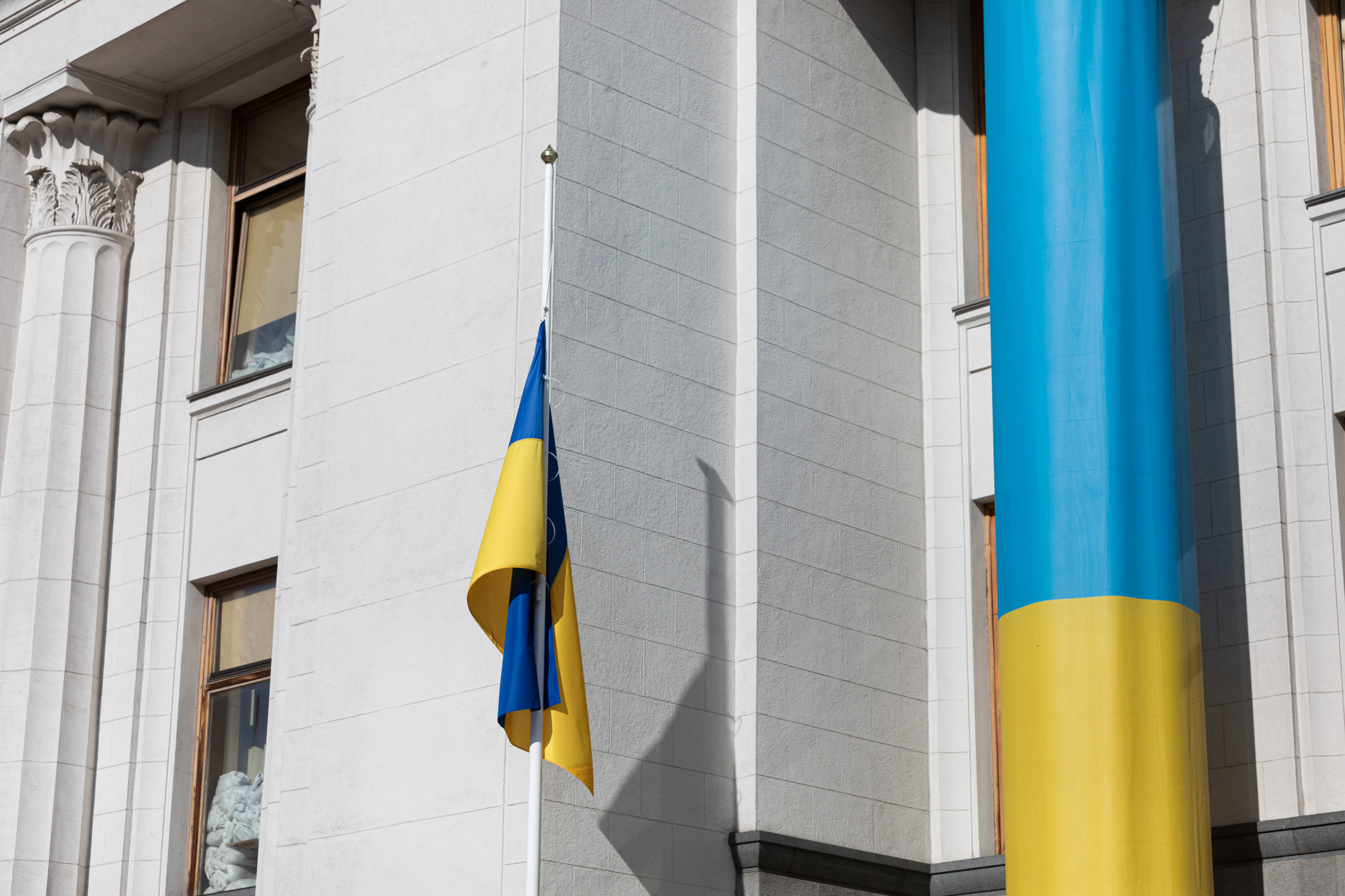“Economic reservation” poses significant risks to the economy, society, and the country’s defense capability. In contrast, establishing a fixed term of service would facilitate mobilization, reduce uncertainty for businesses that would be able to employ veterans, promote social justice, and help bridge the gap between the military and rare.
The full-scale war has been ongoing for the third year, posing new challenges for Ukraine. Businesses are suffering from labor shortage while facing the possibility of losing their current employees to mobilization at any moment. Meanwhile, many people are reluctant to be mobilized, viewing it as a “one-way ticket.” Additionally, the war negatively impacts the economy and budget revenues.
The authorities and businesses suggest filling the budget and securing workers for companies by reserving those eligible for military service for non-critical enterprises, a measure known as economic reservation. Six draft laws registered in the parliament (No. 11331, 11331-1, 11332, 11332-1, 11332-2, and 11308) propose reservations for:
- Business entities, including individual entrepreneurs (IEs), who pay a monthly fee of UAH 20,400 for each employee or for themselves;
- IEs with a monthly revenue of at least UAH 61,200;
- IEs or employees with a monthly salary of at least UAH 36,336 without an additional fee;
- Enterprises, organizations, and institutions with at least ten employees paying Unified Social Contribution (USC) of UAH 40,000 per month, allowing up to 50% of employees to be reserved;
- Officially employed individuals or IEs eligible for automatic reservation if they pay at least UAH 8,000 in taxes per month.
Risks of the economic reservation draft laws
MPs propose a wide range of reservation mechanisms in these draft laws, but have they considered the risks these mechanisms pose to defense capability, society, and long-term economic development? Among these risks are:
- Corruption
Economic reservation should foresee special inspections to ensure that employers (including individual entrepreneurs) do not take bribes to hire people for artificially created positions or do not provide fictitious employment to avoid mobilization. Without such inspections, any enterprise could reserve some people for a “fee” or “sell reservations” for non-existent vacancies.
- Division of society into “classes”
Those who have financial stability and money would effectively be able to “buy their way out” by paying for economic reservation, thereby exacerbating social inequality. The “war for the poor” could further worsen the psycho-emotional state of Ukrainian people and increase social tensions.
- Ignoring the interests of active military personnel, i.e. injustice
Many current army servants in their civilian life had professions and earnings that could have spared them from mobilization. However, the proposed draft laws on economic reservation do not provide any opportunity for army servants to be discharged, pay a reservation fee, and contribute to the budget.
- Defense capability
Such “monetary” criteria for reservation do not consider the personnel needs of the army.
- Increased unemployment and decreased tax revenues
Small businesses, such as individual entrepreneurs with up to 10 employees, that cannot afford economic reservation of their staff will be forced to shut down, resulting in a loss of budget revenue from these enterprises. This will also lead to higher unemployment rates and increased demand for unemployment benefits, thus reducing budget revenues and increasing its expenditures.
Opinions of Ministries and recommendations of lawyers
The Ministry of Agrarian Policy does not support the main draft law 11331, as the specified salary and tax payment amounts are too high for many agricultural enterprises. Consequently, mobilization could disproportionately affect agrarian regions.
The Ministry of Defense also opposes this draft law 11331, arguing that economic reservation would violate one of the principles of mobilization preparedness—guaranteed sufficiency, which emphasizes the need to maintain a balance between providing the national economy with workforce and ensuring that the army is adequately staffed with personnel.
In its analysis, the NGO “Legal Hundred” cites comments from the Ministry of Economy that “the level of employee wages is already one of the industry criteria that the Ministry uses when determining enterprises as critically important to the national economy.” It also references remarks from the State Tax Service, noting that “[draft law No] 11332 may pose risks to individuals who are already reserved under current legislation, as their employers may be forced to pay this fee, or in the case of non-payment, key individuals may be mobilized.”
Additionally, the authors of draft laws do not provide any justification for the wage level criterion (e.g., why it should be UAH 36,336 but not UAH 35,000 or UAH 37,000). Considering these factors, analysts from the “Legal Hundred” recommend not to support the draft laws on economic reservation.
Solving the budget revenue problem
The U.S. Special Representative for Ukraine’s Economic Recovery, Penny Pritzker, proposed a method for simultaneously filling the budget and fighting corruption. She suggested that instead of raising taxes, the focus should be on reforming customs operations and tackling gray markets. “There are revenues you are not collecting that you should be collecting today. Let’s focus on that first,” Pritzker said.
Overall, the economic reservation draft laws create an impression that they were developed not to save the country but to appease voters and to protect certain business players, such as IT, aviation transport, finance, and insurance (considering the State Statistics Service report on average wage levels), as well as others who can afford to pay the military levy for any employee or raise salaries to the required UAH 36,336.
Solving the labor shortage problem
NGO “The Intention” proposes a long-term strategy of rotation of military personnel as an alternative to short-term employee reservations without compromising the defense capability and military effectiveness. The proposal includes:
- Introducing legislation that permits demobilization after servicing a defined term, e.g. allowing soldiers to demobilize after 36 months, if 12 of those months were served in the combat zone;
- Allowing critical enterprises to reserve 50% of their employees, if half of those reserved are veterans and reservists who have been demobilized.
Taking into account that Russia is waging a war of attrition against us, rotation of servicemen and timely replacement of personnel without exhausting soldiers to the point of losing effectiveness is a necessity and perhaps the only condition for the survival of Ukrainians as a free nation.
Legislatively defined terms of service would bring the following benefits to businesses, society, and the military:
- Demobilized personnel could return to their previous jobs, revive pre-war businesses, or start new ones, thus creating employment opportunities.
- Businesses would benefit from a predictable timeframe for employee mobilization and an ability to forecast to some extent the number of employees who will return to their jobs.
- Mobilization would be easier, as 63.8% of men of mobilization age are afraid of army service due to its undefined terms. Defined service terms would improve perception of the army from its current “one-way ticket” to the temporary civic duty.
- Corruption levels would decrease, as people (both service members seeking ways to be demobilized as well as those eligible for military service but attempting to avoid it due to undefined terms) would no longer pursue such avenues.
- The timely replacement of physically and mentally exhausted soldiers would enhance military effectiveness and defense capabilities, Clearly defined service terms would motivate active military members by providing a clear endpoint to their service.
- This would ensure equal rights and duties for all citizens, as foreseen by the Constitution, reducing the growing divide between civilians and the military.
- It would also reduce the burden on the healthcare system and budget spending on healthcare because prolonged exposure to combat stress and battlefield conditions directly contributes to the onset and progression of cardiovascular, nervous system, musculoskeletal, digestive and other diseases.
Defined duration of service would help foster a positive image of military personnel in the society—as those who have fulfilled their duty to the Homeland, returned alive to civilian life, and continue to work and contribute to the economy. This would raise the prestige of the military profession and also partially solve both mobilization challenge and labor shortages. Because veterans would be able to fill in vacancies having a lower likelihood of being mobilized again.
Together with successful veteran policies already in place, adopting a law that establishes clear duration of service is a strategic, long-term decision similar to the customs reform proposed by the U.S. representative to boost budget revenues. Hopefully lawmakers, when drafting legislative changes, will be guided by a long-term perspective rather than short-term considerations of appealing to voters and collecting some more cash.
Фото: depositphotos.com/ua
Attention
The author doesn`t work for, consult to, own shares in or receive funding from any company or organization that would benefit from this article, and have no relevant affiliations



